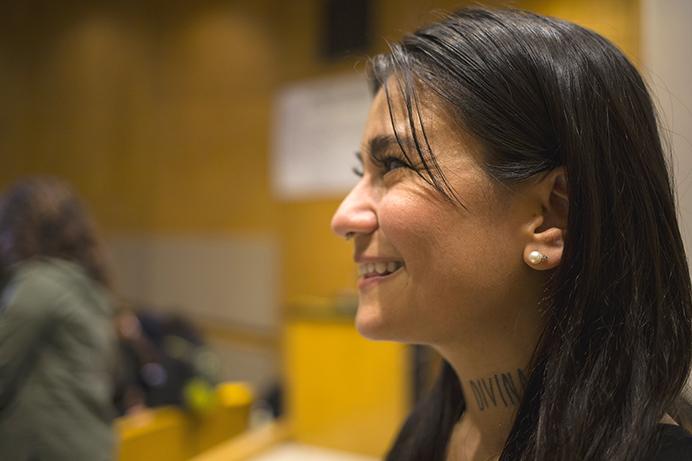By Naomi Hofferber
University of Iowa students had the opportunity to see a new perspective through Prisca Dorcas Mojica Rodriguez, the founder of Latina Rebels, and understand through personal stories issues of racism, sexism, and fighting an oppressive culture.
The event comes in collaboration with Cesar Chavez week, which honors the efforts of Chavez in fighting for civil rights and workers’ rights. Chavez cofounded the National Farm Workers Association in 1962. The UI Latino Native American Cultural Center is hosting events throughout Cesar Chavez week, including film screenings and discussions regarding the topic.
Rodriguez discussed growing up as a Latina and the difficulties she encountered, including issues of racism and sexism and being expected to aspire to marriage over graduate school.
Throughout graduate school, she dealt with issues such as casual racism; she related a story of meeting someone at the bar, and his not believing that she went to the same university.
“He could not wrap his mind around a girl like me, going to the same institution that he went to,” she said. “It was the first realization that I didn’t ‘read’ as smart. I’ve been told all my life, and when I went to grad school that you have to sound smart because this is how people respect you, and you have be a good girl because this is how you get ahead. I had to give up parts of myself or tame parts of myself in order to be accepted and loved, and it felt fake.”
Rodriguez uses storytelling to explain issues of racism and sexism that she has directly experienced, and have them be relatable and understandable.
She recalled incidents of racism, including a Cinco de Mayo party people in her institution held, with tequila and sombreros, that led to the creation of Latina Rebels, an organization to unveil injustices that exist in Latina realities.
“I made Latina Rebels [when I was] really, really mad,” Rodriguez said. “So when people are all, you know, all the ‘Love Trumps Hate,’ you know, we just have to build bridges, you have to make people understand you — no. I made Latina Rebels pissed as fuck, and I was burning a whole lot of bridges, but with the logs I built a whole lot of bridges that have led to way better places than I had ever been.”
Rodriguez, who writes for a variety of organizations, including Philadelphia Printworks, TeleSur, SupaDaily Latina, Chica Magazine, Mitú, BeVisible Latinx, and Vivala, read pieces that described her realities, including the loneliness of being misunderstood by traditional parents, dating a white man, and dealing with ignorance that can come with it, and being proud of herself and her identity.
“I think this has been a recurring theme lately, at least in my life, I’ve continuously gone to talks and been surrounded by women, in my case Latina women, who’ve expressed the need for more,” said Isabela Flores, a representative with the Association of Latinos Moving Ahead. “That resonates with me. Being Latina, it really sticks with me.”
Flores said that in primarily white institutions, like Iowa, there is a need for uncomfortable conversations for individuals to understand a different point of view.
“Her coming in with an unapologetic attitude, that’s necessary,” Flores said. “I like that.”
Xiomara Santana, one of the event organizers said that she hopes more events like this take place in the future, in order to allow students to understand these issues.
“I think that [it’s important] because this is a PWI,” Santana said. “If you noticed, a lot brown students sat up front because we know her work, we’re familiar with what she talks about, we all go through that struggle that she talks about. This was really for the white students to come, and listen, and to hear, and kind of feel a little bit left out and attacked because that’s how brown students feel here, especially with so many political things happening the past two years.”



